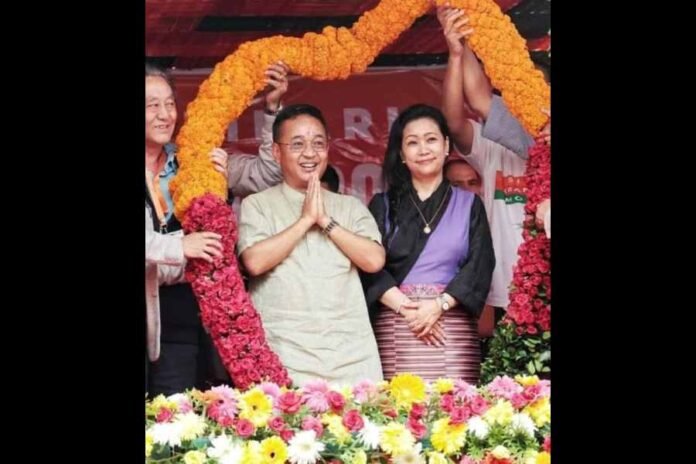Krishna Kumari Rai, the wife of Chief Minister Prem Singh Tamang, popularly known as Golay, has announced her candidacy for the upcoming Lok Sabha polls. Rai’s decision to enter the electoral fray marks a notable foray into national politics and has sparked discussions about the evolving political landscape in the mountainous state.
Krishna Kumari Rai’s candidacy carries with it a unique blend of personal and political dynamics. As the wife of the Chief Minister, Rai brings a wealth of experience in grassroots activism, social work, and community engagement. Her involvement in various welfare initiatives and her deep connections with the people of Sikkim have earned her respect and admiration across the state.
Rai’s decision to contest the Lok Sabha polls underscores her commitment to public service and her desire to play a more active role in shaping the future of Sikkim at the national level. By entering the political arena, Rai seeks to amplify the voices of ordinary citizens, champion their concerns, and advocate for policies that promote inclusive growth and development.
Moreover, Rai’s candidacy is significant in the context of gender representation in politics. As a woman leader vying for a seat in the Lok Sabha, Rai embodies the spirit of empowerment and gender equality, challenging traditional norms and stereotypes. Her candidacy sends a powerful message about the importance of women’s participation in decision-making processes and their role in driving social and political change.
However, Rai’s entry into the Lok Sabha polls also raises questions and prompts discussions about the intersection of familial ties and political leadership. Critics have voiced concerns about the potential for conflicts of interest and nepotism, given her relationship with the Chief Minister. They argue that Rai’s candidacy could blur the lines between personal and public interests, undermining the principles of transparency and accountability in governance.
Furthermore, Rai’s candidacy comes at a time of heightened political activity and electoral competition in Sikkim. With the Lok Sabha polls shaping up to be a closely contested affair, Rai’s candidacy adds a new dimension to the political landscape, with implications for both regional and national politics. Her entry into the fray could influence voter perceptions, party strategies, and alliances in the run-up to the polls.
The decision to field Krishna Kumari Rai as a candidate also reflects the political calculus of the ruling party in Sikkim. By nominating Rai, the Sikkim Krantikari Morcha (SKM) seeks to capitalize on her popularity and goodwill among voters, leveraging her candidacy to strengthen its electoral prospects. Rai’s candidacy serves as a strategic move to consolidate the party’s support base and broaden its appeal across demographic groups.
However, Rai’s candidacy is not without its challenges. As a political newcomer, she will need to navigate the intricacies of electioneering, campaign management, and policy articulation. Moreover, she will face scrutiny from opponents and critics, who may question her credentials and readiness for public office. Rai’s ability to address these challenges and connect with voters will ultimately determine the success of her electoral bid.
In addition, Krishna Kumari Rai’s decision to contest the Lok Sabha polls in Sikkim adds a new dimension to the state’s political landscape. As the wife of Chief Minister Prem Singh Tamang Golay, Rai brings a unique blend of personal and political experience to the electoral arena. Her candidacy underscores the importance of women’s participation in politics and highlights the evolving dynamics of governance and leadership in Sikkim. As Rai embarks on her electoral journey, all eyes will be on her as she seeks to make her mark on the national stage and advocate for the interests of the people of Sikkim.


